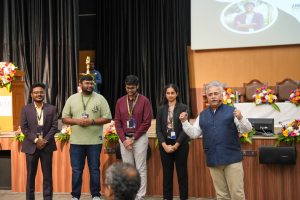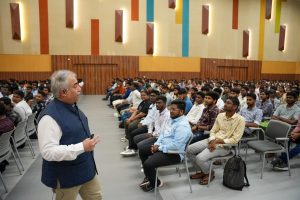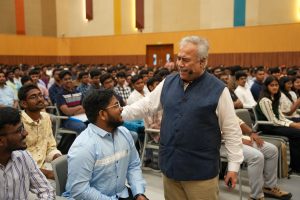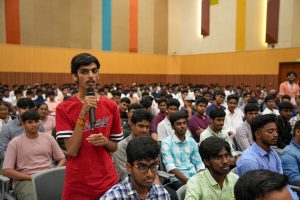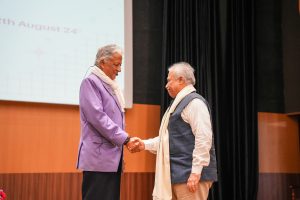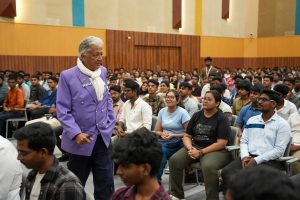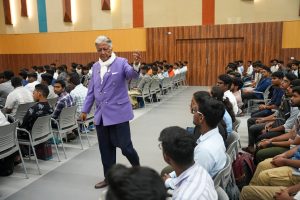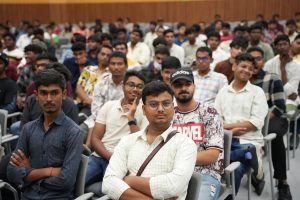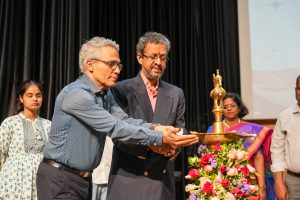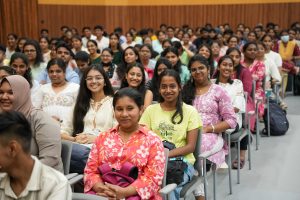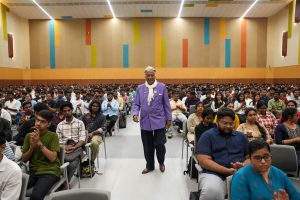All Management Events
- Dr Prasun Goswami August 17, 2024
- Mr M Adalf August 17, 2024
- Dr Sachchidanand August 16, 2024
- 78th Independence Day Celebrations at SRM University-AP August 16, 2024
The Hans India
Continue reading →
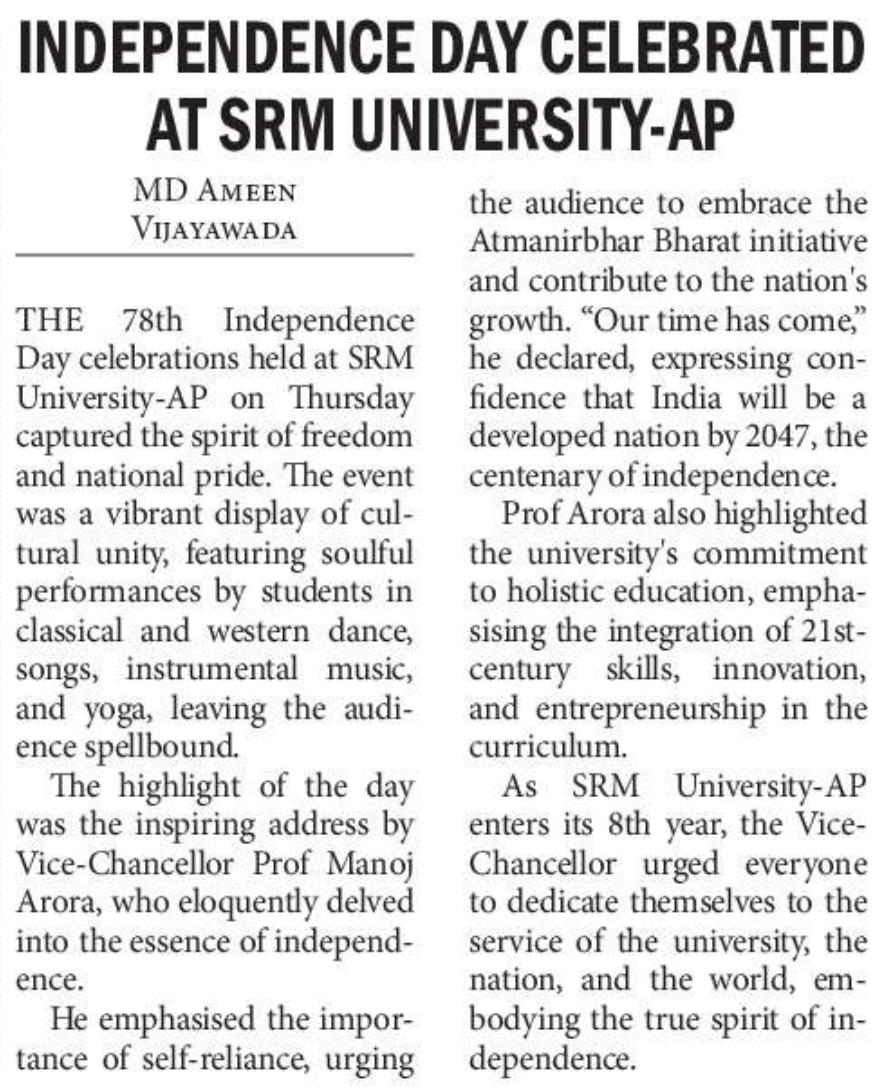
The New Indian Express

Eenadu
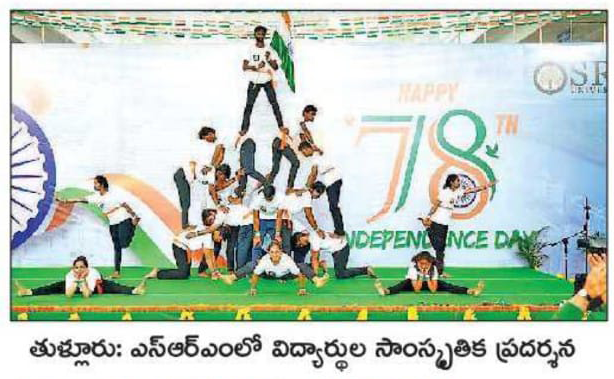
Andhra Patrika
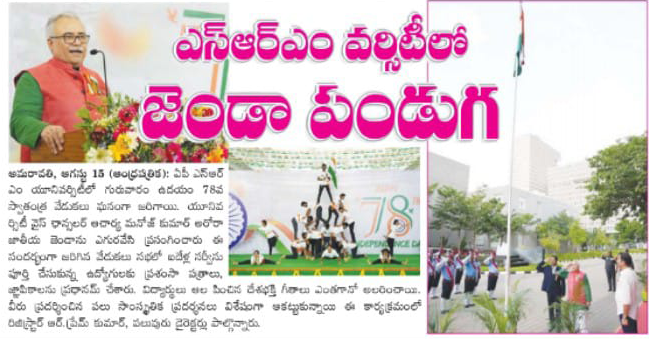
Andhra Prabha
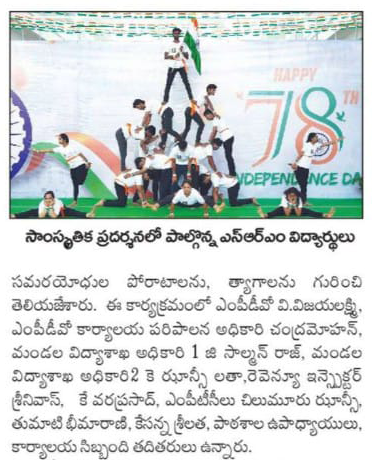
Vartha
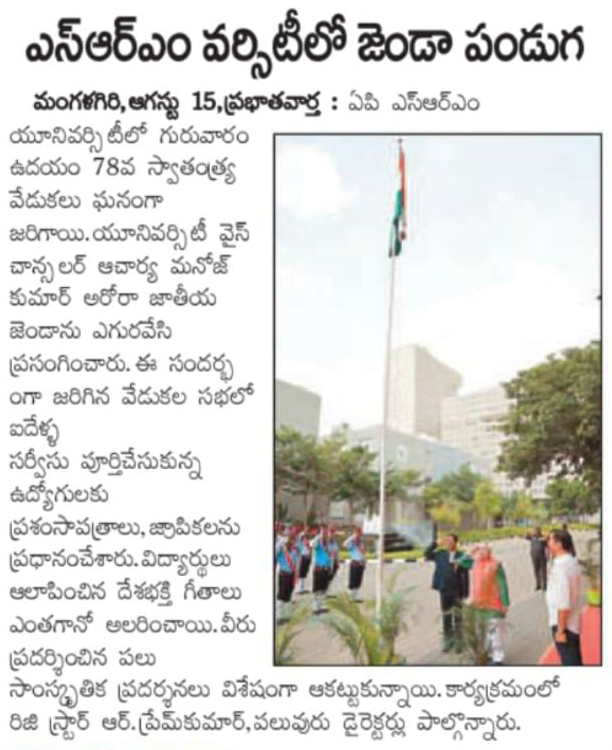
- UDAAN 2024 Orientation Programme Commences at SRMAP August 13, 2024
The New Indian Express
Continue reading →
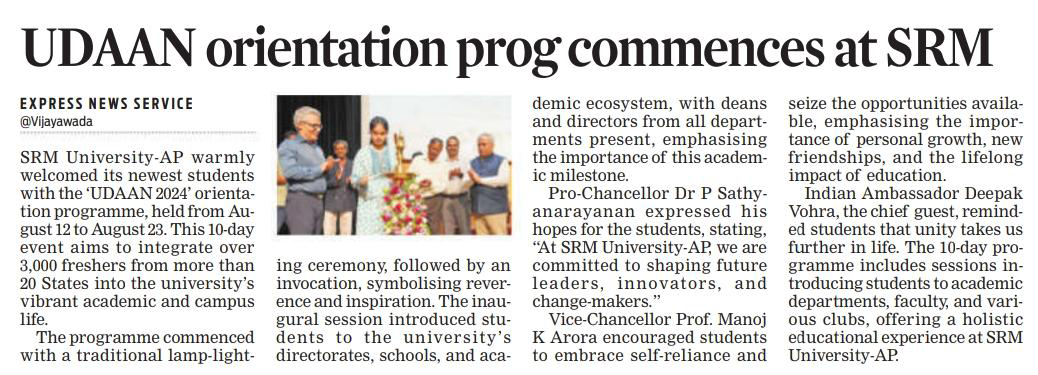
The Pioneer
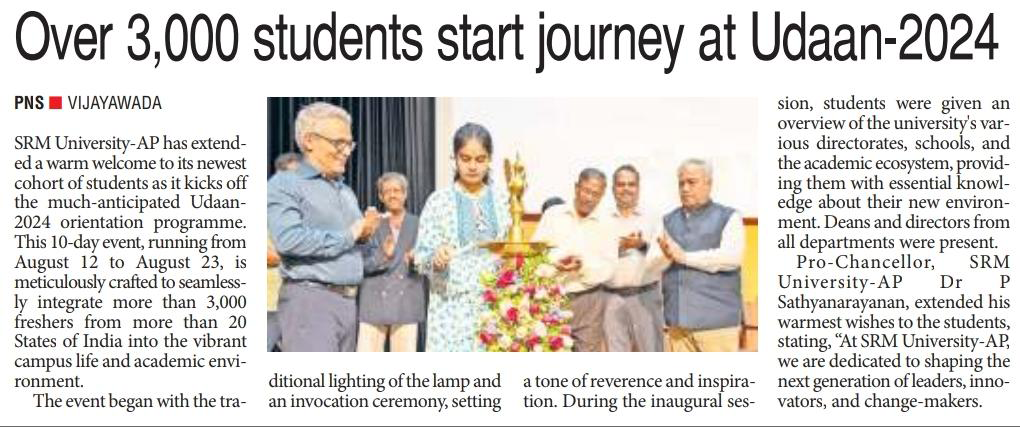
The Hans India

Eenadu
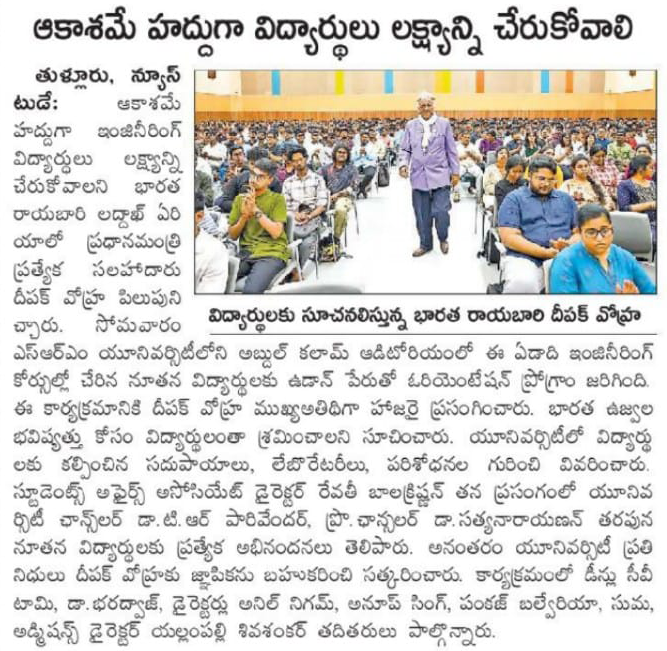
Andhra Prabha
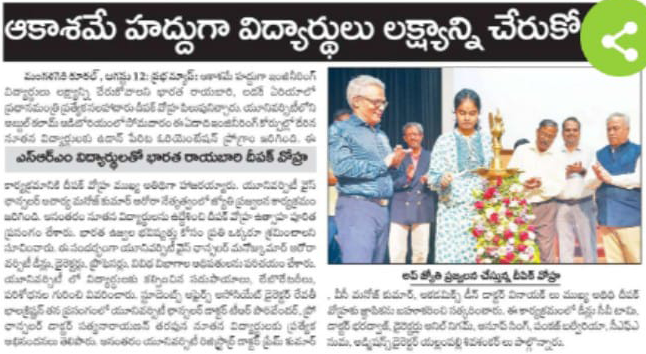
Visalaandhra
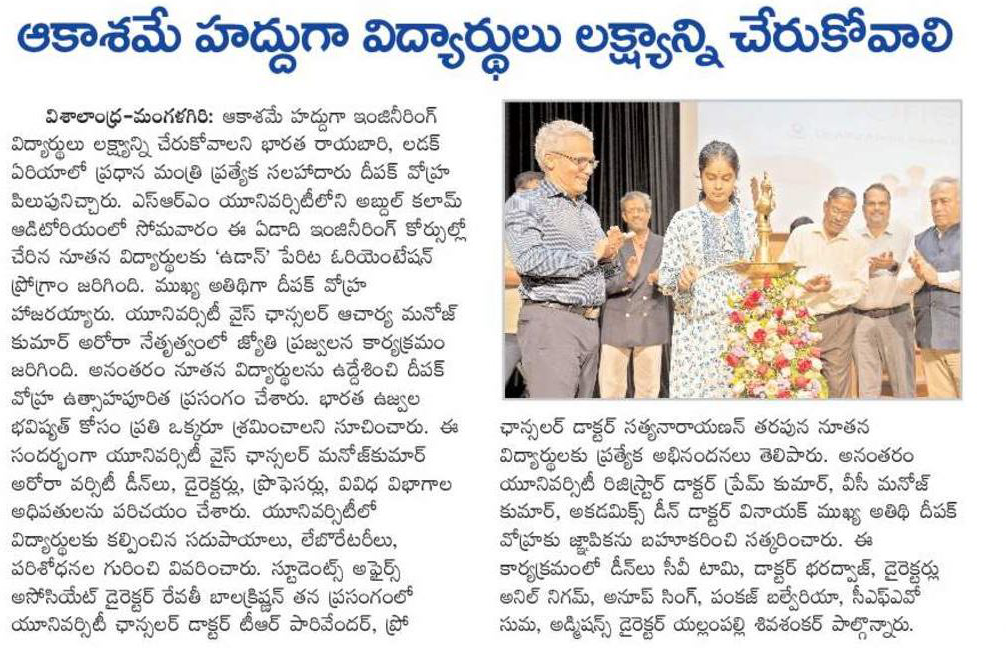
Andhra Patrika
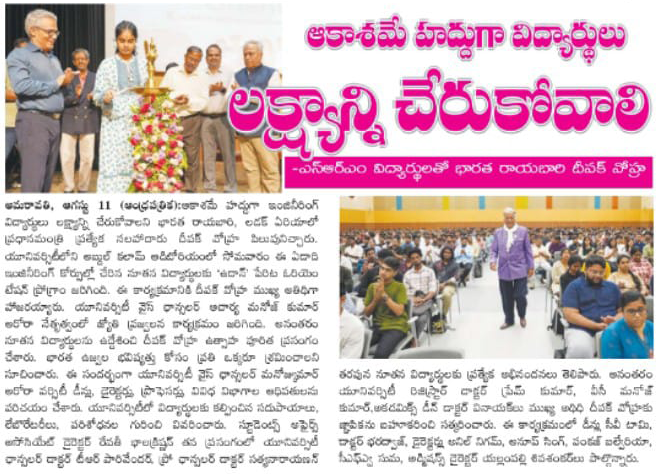
- New Chapter Begins: Over 3000 Students Start Their Journey at SRM AP August 13, 2024
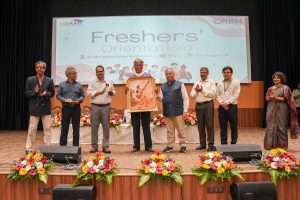 SRM University-AP extends a warm welcome to its newest cohort of students as it kicks off the much-anticipated “UDAAN 2024” orientation programme. This 10-day event, running from August 12 to August 23, is meticulously crafted to seamlessly integrate more than 3000 freshers from more than 20 states of India into the vibrant campus life and academic environment.
SRM University-AP extends a warm welcome to its newest cohort of students as it kicks off the much-anticipated “UDAAN 2024” orientation programme. This 10-day event, running from August 12 to August 23, is meticulously crafted to seamlessly integrate more than 3000 freshers from more than 20 states of India into the vibrant campus life and academic environment.The event began with the traditional lighting of the lamp and an invocation ceremony, setting a tone of reverence and inspiration. During the inaugural session, students were given an overview of the university’s various directorates, schools, and the academic ecosystem, providing them with essential knowledge about their new environment. Deans and directors from all departments were present, underscoring the importance of this milestone in the student’s academic journey.
Pro-Chancellor, SRM University-AP Dr P Sathyanarayanan, extended his warmest wishes to the students, stating “At SRM AP, we are dedicated to shaping the next generation of leaders, innovators, and change-makers. With UDAAN 2024, we are excited to empower our students as they embark on this transformative educational journey. It is our hope that this experience inspires each of you to achieve excellence and make a meaningful impact on the world. Welcome to a vibrant community where your future truly begins.”
Vice Chancellor, SRM University-AP, Prof. Manoj K Arora, addressed the new students, encouraging them to embrace self-reliance and to make the most of every opportunity during their time at the university. He motivated the students and said that they have an opportunity to learn new things, acquire new knowledge, grow new competencies, develop new skills and enhance their personal attributes in profound ways that will shape their character for the rest of their lives. Prof. Arora further added that the students have an opportunity to weave new friendships that will impact their lives in incredible ways and that education is not only about acquiring knowledge and skills, but it also prepares us for life.
The programme was honoured by the presence of Indian Ambassador Deepak Vohra ji, Special Advisor to Prime Minister in Africa and Ladakh, who was the chief guest for the event. His address to the students motivated them on how to attain great heights in their careers even in adverse situations through relentless goal setting, hard work, dedication and determination. He further told the students that if we are divided, we can go fast, but if we are united, we can go far. Deepak Vohra concluded his speech with this line, “The future of India is the future of the world. The whole world trusts India because we are intrinsically good people. You are the hope for the future of a safe and secure world.”
Throughout this 10-day programme, students will participate in a series of sessions designed to familiarise them with the university’s offerings. These include introductions to the academic departments, faculty, and administrative staff, as well as insights into the various clubs and associations that contribute to a holistic educational experience at SRM University-AP.
Continue reading → - Algae Biochar: A Promising Solution to Water Pollution August 9, 2024
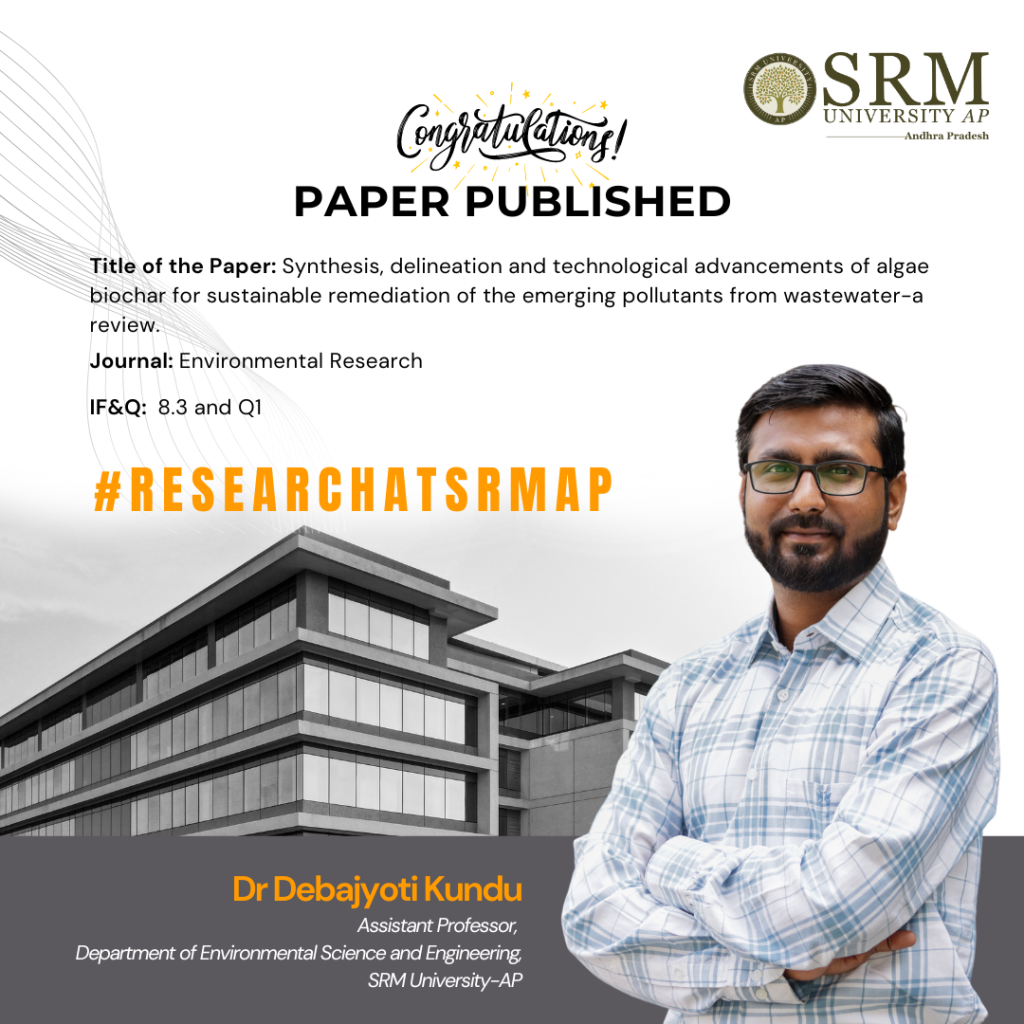
Dr Debajyoti Kundu, Assistant Professor in the Department of Environmental Science and Engineering, has published a research paper titled “Synthesis, delineation and technological advancements of algae biochar for sustainable remediation of the emerging pollutants from wastewater – A Review” in the esteemed Q1 journal “Environmental Research”, which has an impact factor of 8.3.
Dr Debajyoti’s research focuses on using algae biochar, which is particularly effective at cleaning polluted water. The study reviews how this biochar is made and improved and how it can effectively remove harmful substances from wastewater. This process is sustainable and environmentally friendly, offering a promising solution to water pollution.
Abstract
The study examines the synthesis, technological advancements, and applications of algae biochar for the sustainable remediation of emerging pollutants from wastewater. It highlights the unique properties of algae biochar, including its high surface area, pore volume, and adsorption capacity, which make it an effective medium for removing inorganic and organic contaminants from wastewater. The paper discusses various methods for producing algae biochar, such as pyrolysis, gasification, and torrefaction, and explores chemical and structural modifications to enhance its pollutant removal efficiency.
Practical Implementation /Social Implications of the Research
The practical implementation of this research involves using algae-derived biochar in wastewater treatment plants to remove harmful pollutants. This can lead to cleaner water, reduced environmental pollution, and improved public health. The process is also sustainable and cost-effective, contributing to environmental conservation and resource efficiency.
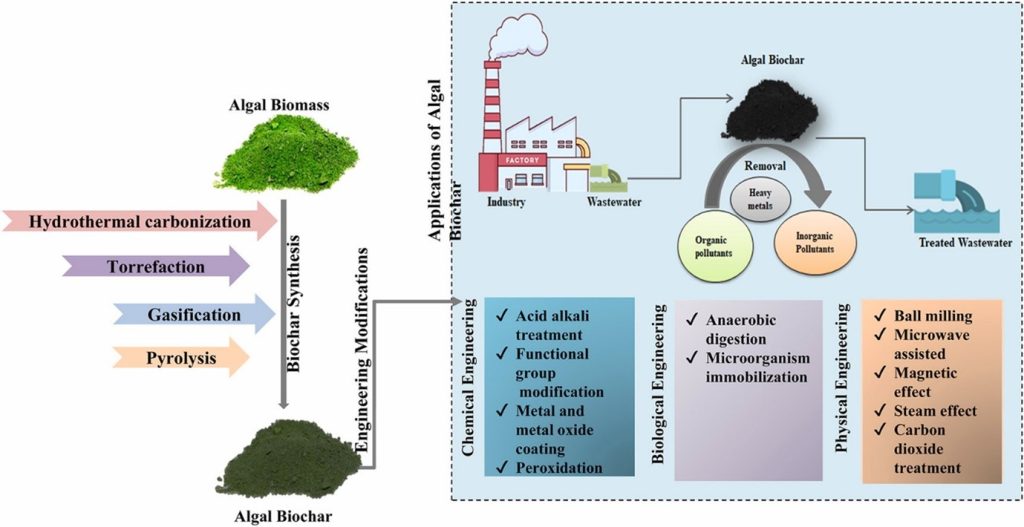
Collaborations
This research is a collaborative effort among various experts from institutions such as the University of Calcutta, Babasaheb Bhimrao Ambedkar University, Koneru Lakshmaiah Education Foundation, Graphic Era Deemed to be University, Indian Institute of Technology Kharagpur, Ranchi University, King Abdulaziz University, Incheon National University, Korea Aerospace University, and B.S. Abdur Rahman Crescent Institute of Science and Technology.
Future Research Plans
Dr Debajyoti’s future research projects include exploring advanced modification techniques for algae biochar to further enhance its pollutant removal capabilities, investigating its application in different types of wastewater, and developing large-scale production methods. Additionally, there is an interest in studying the long-term environmental impacts and economic viability of using algae biochar in wastewater treatment.
Continue reading → - AI-Based Remote Fetal Heart Rate Monitoring Published in Leading Journal August 9, 2024
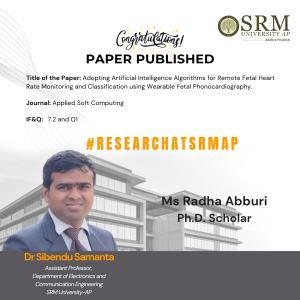 Dr Sibendu Samanta, Assistant Professor in the Department of Electronics and Communication Engineering, and Ms Radha Abburi, a PhD Scholar, have made significant strides in the field of fetal health monitoring. Their paper, titled “Adopting Artificial Intelligence Algorithms for Remote Fetal Heart Rate Monitoring and Classification using Wearable Fetal Phonocardiography,” has been published in the prestigious Q1 Journal, Applied Soft Computing, which boasts an impressive impact factor of 7.2.
Dr Sibendu Samanta, Assistant Professor in the Department of Electronics and Communication Engineering, and Ms Radha Abburi, a PhD Scholar, have made significant strides in the field of fetal health monitoring. Their paper, titled “Adopting Artificial Intelligence Algorithms for Remote Fetal Heart Rate Monitoring and Classification using Wearable Fetal Phonocardiography,” has been published in the prestigious Q1 Journal, Applied Soft Computing, which boasts an impressive impact factor of 7.2.This pioneering study addresses the critical gaps in the analysis of Fetal Heart Rate (FHR) recordings by leveraging wearable Phonocardiography (PCG) signals and advanced AI algorithms. The primary goal of the research is to achieve accurate classification results through the remote monitoring of fetal heartbeats. Additionally, the study tackles complex issues related to data quantity and the inherent complexity of FHR analysis. Dr Samanta and Ms Abburi’s work represents a significant advancement in the field, promising to enhance the accuracy and reliability of fetal health monitoring, ultimately contributing to better prenatal care.
Abstract of the Research:
Fetal phonocardiography (FPCG) is a non-invasive Fetal Heart Rate (FHR) monitoring technique that can detect vibrations and murmurs in heart sounds. However, acquiring fetal heart sounds from a wearable FPCG device is challenging due to noise and artefacts. This research contributes a resilient solution to overcome the conventional issues by adopting Artificial Intelligence (AI) with FPCG for automated FHR monitoring in an end-to-end manner, named (AI-FHR). Four sequential methodologies were used to ensure reliable and accurate FHR monitoring. The proposed method removes low-frequency noises and high-frequency noises by using Chebyshev II high-pass filters and Enhanced Complete Ensemble Empirical Mode Decomposition with Adaptive Noise (ECEEMDAN) in combination with Phase Shifted Maximal Overlap Discrete Wavelet Transform (PS-MODWT) filters, respectively.
The denoised signals are segmented to reduce complexity, and the segmentation is performed using multi-agent deep Q-learning (MA-DQL). The segmented signal is provided to reduce the redundancies in cardiac cycles using the Artificial Hummingbird Optimization (AHBO) algorithm. The segmented and non-redundant signals are converted into 3D spectrograms using a machine learning algorithm called variational auto-encoder-general adversarial networks (VAE-GAN). The feature extraction and classification are carried out by adopting a hybrid of the bidirectional gated recurrent unit (BiGRU) and the multi-boosted capsule network (MBCapsNet). The proposed method was implemented and simulated using MATLAB R2020a and validated by adopting effective validation metrics.
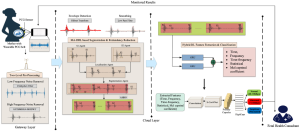
The results demonstrate that the proposed method performed better than the current method with accuracy (81.34%), sensitivity (72%), F1-score (83%), Energy (0.808 J), and complexity index (13.34). Like other optimization methods, AHO needs precise parameter adjustment in order to function well. Its performance may be greatly impacted by the selection of parameters, including population size, exploration rate, and learning rate.
The title of the Research Paper in the Citation Format:
R. Abburi, I. Hatai, R. Jaros, R. Martinek, T. A. Babu, S. A. Babu, S. Samanta, “Adopting artificial intelligence algorithms for remote fetal heart rate monitoring and classification using wearable fetal phonocardiography”, Applied Soft Computing, vol. 165, pp. 112049, 2024, ISSN 1568-4946.Practical Implementation or the Social Implications Associated with the Research
- Chebyshev filter and EC2EMDAN-PS-MODWT reduce low and high frequency noises.
- MA-DRL and optimization algorithms reduce complexity during classification.
- Machine learning spectrogram conversion to capture time, frequency, and spectral variations.
- Hybrid deep learning algorithms can be used to reduce positive rates.
Collaborations:
- Dr. Indranil Hatai (Signal Processing and FPGA, Mathworks, Bangalore, India)
- Dr. T. Arun Babu (HoD, Dept. of Pediatrics, All India Institute of Medical Sciences (AIIMS), Andhra Pradesh, India)
- Dr. Sharmila Arun Babu, MBBS, MS (HoD, Dept. of Obstetrics and Gynecology, All India Institute of Medical Sciences (AIIMS), Andhra Pradesh, India)
- Dr. Rene Jaros (Dept. of Cybernetics and Biomedical Engineering, Faculty of Electrical Engineering and Computer Science, VSB–Technical University of Ostrava, 708 00, Ostrava, Czechia)
- Prof. Radek Martinek (Dept. of Cybernetics and Biomedical Engineering, Faculty of Electrical Engineering and Computer Science, VSB–Technical University of Ostrava, 708 00, Ostrava, Czechia)
Future Research Plans:
- Design a low cost for continuous fetal heart rate (FHR) monitoring system
- Develop a proper deep learning algorithm to get a proper understanding of fetal’s abnormality.
- Scaling Heights: Nilesh Bags an Internship at RBI August 9, 2024
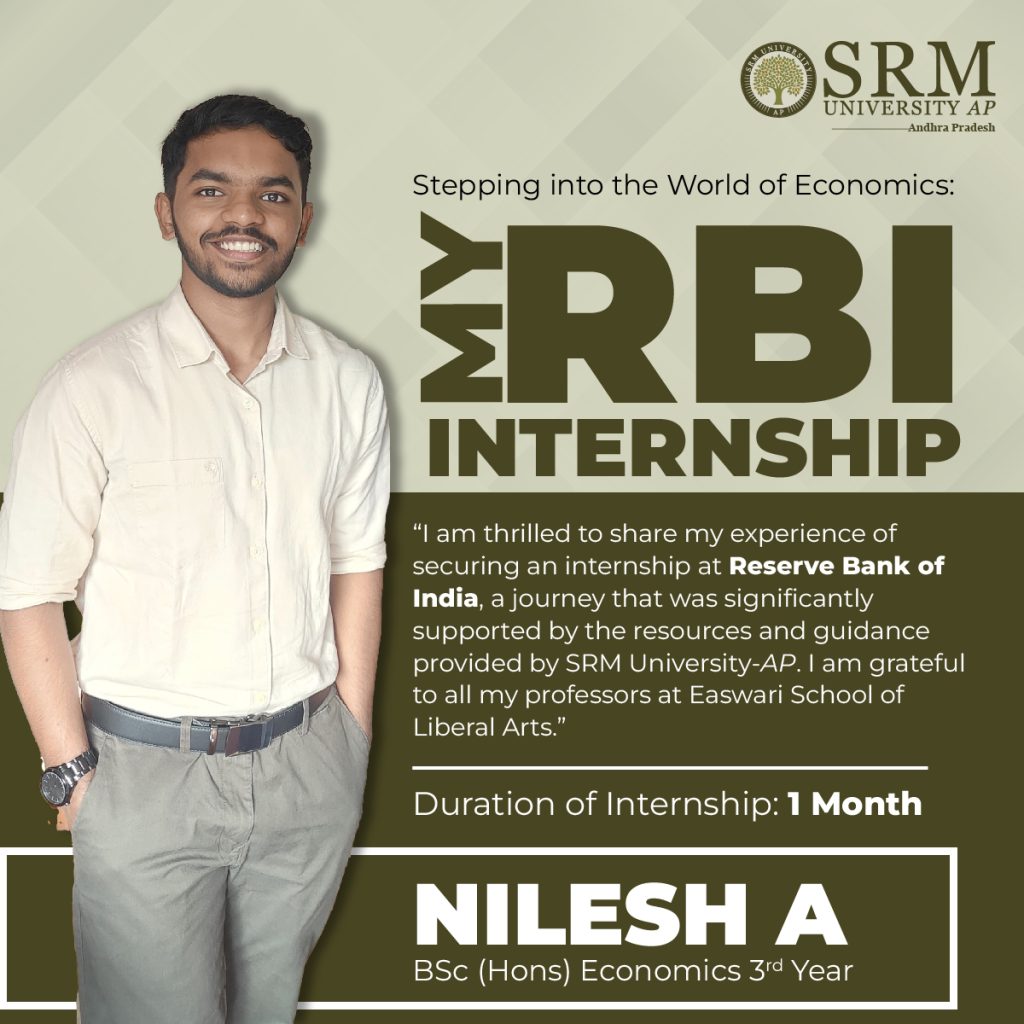
The Department of Economics proudly announces that Mr Nilesh A, a third-year B.Sc. Economics (Hons.) student, has secured a highly coveted one-month research-based internship at the Reserve Bank of India, Mumbai. This internship is under the Department of Economic and Policy Research (DEPR).
“I am thrilled to share my experience of securing an internship at the Reserve Bank of India, a journey that was significantly supported by the resources and guidance provided by my university. I am grateful to all my professors at Easwari School of Liberal Arts at SRM University-AP for their unwavering support and encouragement. This internship is a pivotal step in my career, and I am excited about the future and eager to continue building on this incredible foundation,” stated Nilesh while expressing his gratitude for this once-in-a-lifetime opportunity.
Internships are remarkable opportunities to gain experience and exposure, build a strong network, and hone the skills you already possess. The Easwari School of Liberal Arts of SRM University-AP provides academic and research internships prioritising experiential and industry-based learning to help students cultivate a refined practical skillset.
Continue reading → - A Novel Breakthrough on Developing Heterogeneous Small-World LPWANs August 9, 2024
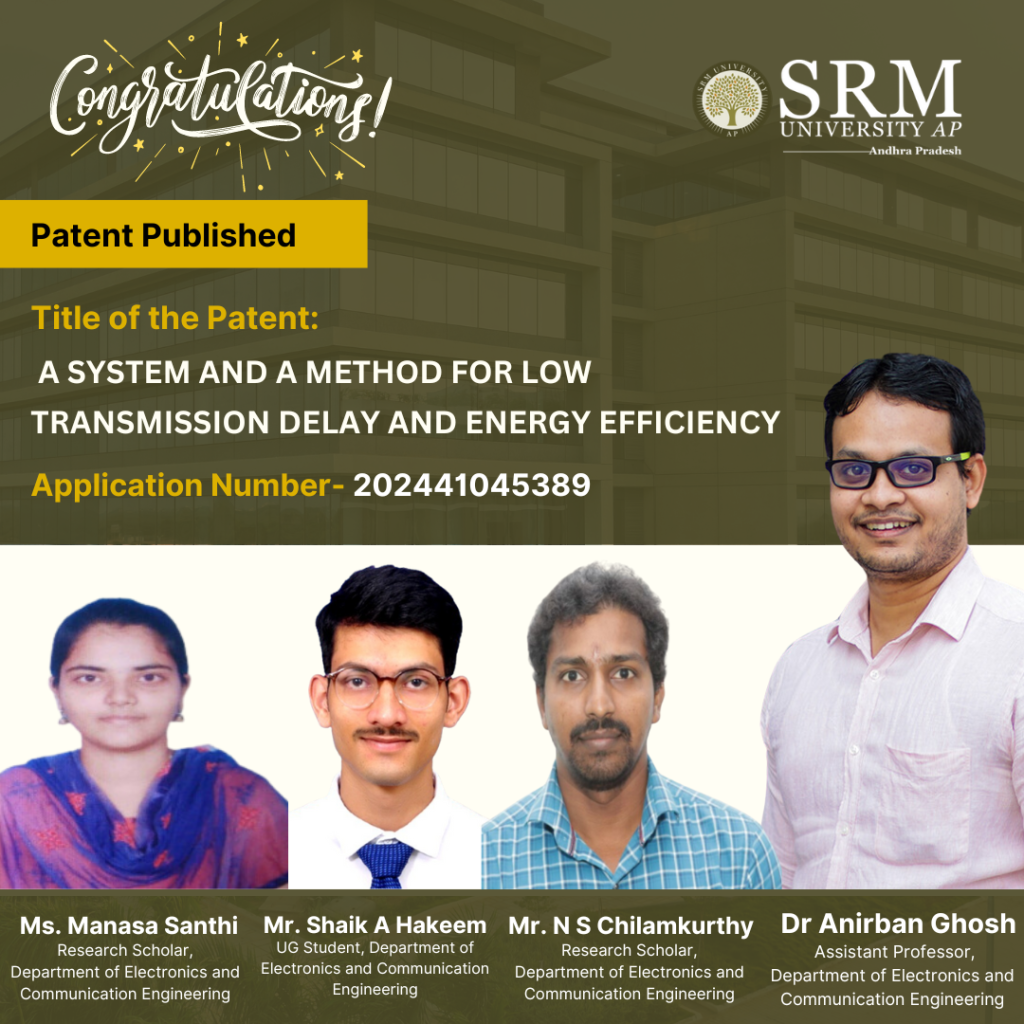
The Department of Electronics and Communication Engineering is delighted to announce that Assistant Professor Dr Anirban Ghosh, PhD scholars Mr Naga Srinivasarao and Ms Manasa Santhi, and BTech student Mr Sk Abdul Hakeem have filed and published their patent, “A System and a Method for Low Transmission Delay and Energy Efficiency,” with Application No: 202441045389. The research cohort has demonstrated groundbreaking research on integrating Small-World Characteristics (SWC) into Low-Power Wide-Area Networks (LPWANs) through Reinforcement Learning.
Abstract
To support the rapid growth of Internet of Things (IoT) applications, networking technologies like Low-Power Wide-Area Networks (LPWANs) are evolving to provide extended network lifespan and broader coverage for Internet of Things Devices (IoDs). These technologies are highly effective when devices remain stationary under static conditions. However, practical IoT applications, ranging from smart cities to mobile health monitoring systems, involve heterogeneous IoDs that move dynamically, leading to changing network topologies. Typically, dynamic networks use multi-hop data transmission schemes for communication, but this method presents challenges such as increased data latency and energy imbalances. To address these issues, this patent introduces a novel approach that integrates recent advancements in social networks, specifically Small-World Characteristics (SWC), into LPWANs using Reinforcement Learning. Specifically, the SWCs are embedded into heterogeneous LPWANs through the Q-learning technique. The performance of the developed heterogeneous Small-World LPWANs is then evaluated in terms of energy efficiency (including the number of alive and dead IoDs, as well as network residual energy) and data transmission delay within the network.
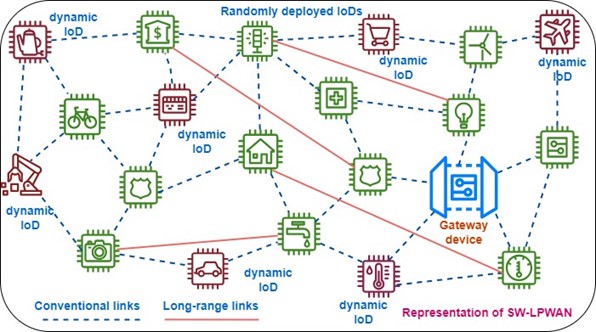
Explanation of Research in Layperson’s Terms
The existing or the present technology moves around the applications that are either static or dynamic in nature, but the current invention considers a realistic IoT application that contains both static and dynamic nodes in the network. However, maintaining low data transmission delay and high network longevity over such a heterogeneous network is a challenge. By integrating SWCs over the developed heterogeneous networks using Q-learning technique helps in minimizing the data transmission delay and improves the network lifetime (energy efficient data transmission).
Practical Implementation of the Research
Applications that contain both static and dynamic nodes, such as smart health care systems, smart environmental monitoring systems, real-time traffic monitoring systems, and smart cities and homes, require less data transmission delay and high network longevity.
Collaborations
- Dr Om Jee Pandey – Assistant Professor, Department of Electronics Engineering, Indian Institute of Technology (BHU) Varanasi
- Dr Satish Kumar Tiwari – Assistant Professor, IIITDM Jabalpur, India
In the next phase of research, the reserach team will work towards investigating how the energy efficiency and other quality of service of smart devices in an IoT setting can be improved if they are completely mobile.
Continue reading →


